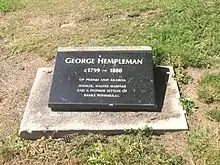Peraki
Peraki, a Māori language place name with an initial spelling of Pireka, is a bay on the south side of Banks Peninsula, New Zealand. It is the site of the first permanent European settlement in Canterbury.[1][2] George Hempelman, a Prussian whaler, established a whaling station in the bay in 1835, and from 1837 lived there permanently.[3] Peraki has a small cemetery, one of the earliest European cemeteries in New Zealand.[4]

The Wairewa and Akaroa Counties paid for a memorial to Hempelman that was placed on Peraki Beach in March 1939. The memorial is made up of a whale try pot with the following inscription:[5]
Erected to commemorate the centenary of the first white settler in Canterbury, New Zealand, Captain George Hempelman, who established a whaling station at Peraki in 1835.
Hempelman flew the German flag in front of his house, and in 1840[6] he was ordered by Captain Owen Stanley of HMS Britomart to take it down, with the Union Jack raised instead.[5]
References
- "Christchurch: a history". Christchurch City Libraries. Retrieved 22 January 2015.
- Wises New Zealand Guide (7th ed.). 1979. p. 343.
- Crean, Mike (6 April 2013). "The glory days of whaling long gone". The Press. p. C12.
- Du Plessis, Rosemary (15 December 2014). Death and dying - Burials and cemeteries. Te Ara: The Encyclopedia of New Zealand. Retrieved 22 January 2015.
- "Hempelman Memorial". Akaroa Mail and Banks Peninsula Advertiser. LXIII (6522). 31 March 1939. p. 1. Retrieved 22 January 2015.
- Berry, P. L. (1964). "II - Early Germans in New Zealand and the Chatham Islands". Germans in New Zealand: 1840 to 1870 (PDF) (thesis). University of Canterbury. Retrieved 22 January 2015.